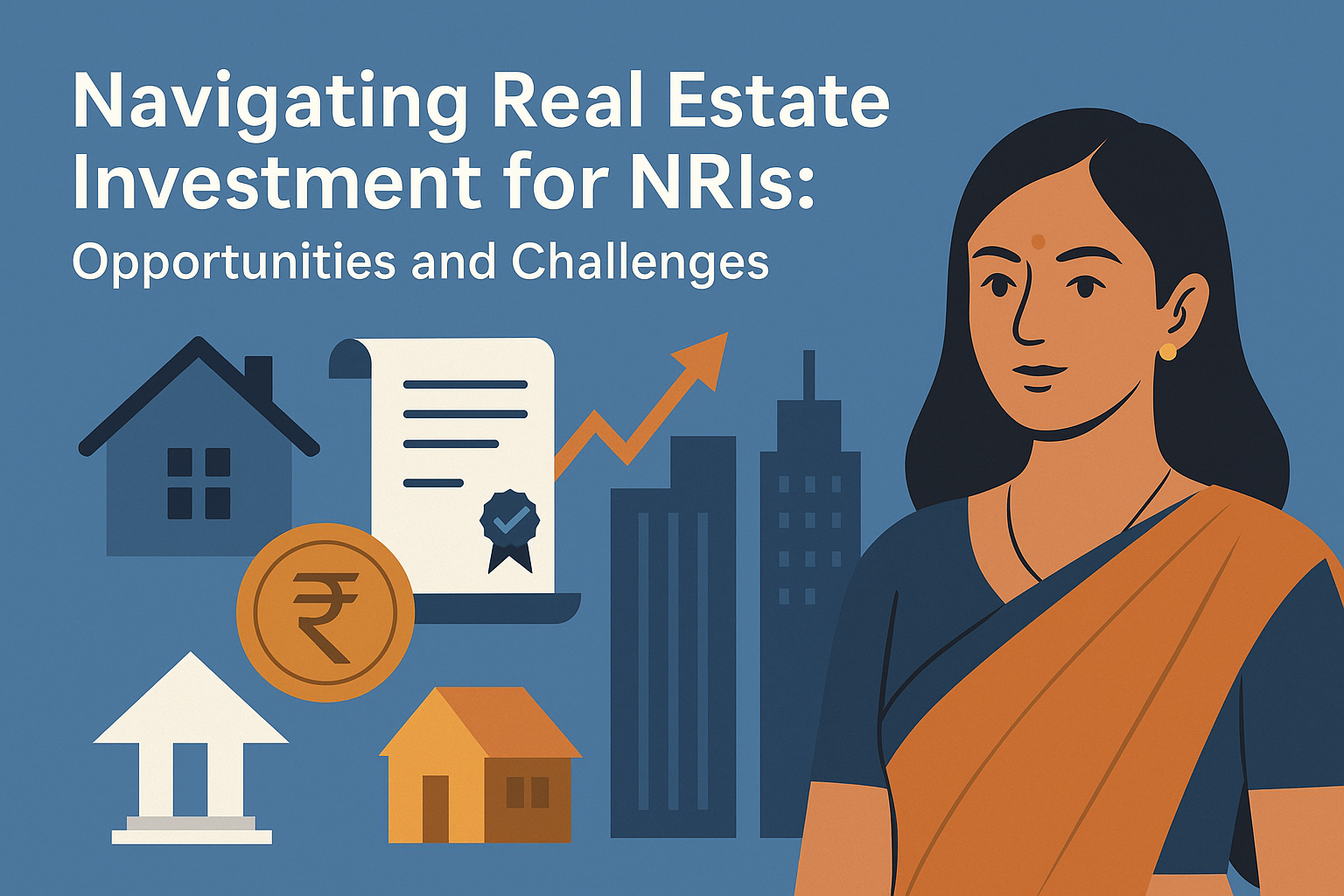Non-Resident Indians (NRIs) have increasingly turned their attention to the Indian real estate market over the past decade. With a booming property sector, favorable exchange rates, and growing confidence in India’s economy, real estate offers a lucrative avenue for NRIs to invest in their homeland. However, while the opportunities are vast, the road is often riddled with legal, financial, and regulatory complexities. This guide explores the scope, benefits, and challenges of NRI real estate investment in India and how to navigate them effectively.
Why NRIs Are Investing in Indian Real Estate
India's real estate market is seen as a safe and tangible investment by NRIs. Unlike volatile stock markets, property offers stability and the potential for consistent returns. Key reasons for the uptick in NRI real estate investments include:
Emotional Connect: Many NRIs wish to maintain a base in their home country or plan to return post-retirement.
High ROI: Rental yields in metro cities and Tier 2 cities are becoming more attractive.
Currency Advantage: A stronger dollar or euro compared to the Indian rupee enhances purchasing power.
Infrastructure Growth: Rapid urban development and infrastructure expansion have made properties in India more appealing.
Types of Properties NRIs Can Invest In
As per the Reserve Bank of India (RBI) guidelines under FEMA (Foreign Exchange Management Act), NRIs are allowed to invest in:
Residential properties (apartments, villas, houses)
Commercial properties (offices, shops, showrooms)
However, NRIs cannot invest in agricultural land, farmhouses, or plantations unless it is inherited or gifted.
Opportunities in the Indian Real Estate Market
1. Metro Cities & IT Hubs
Cities like Bengaluru, Hyderabad, Pune, and Chennai have seen a steady increase in property prices due to growing demand from IT professionals and startups.
2. Tier 2 Cities
Smaller cities like Indore, Lucknow, and Kochi are emerging as attractive investment destinations with high rental yields and lower entry costs.
3. Luxury and Holiday Homes
NRIs looking for long-term stays or vacation homes are investing in tourist destinations like Goa, Shimla, and Kerala.
4. Commercial Real Estate
Coworking spaces, retail shops, and office spaces are trending among NRIs due to better rental income.
Legal Framework and Documentation for NRIs
Understanding the legalities is essential for hassle-free NRI real estate investment in India. Here's what every NRI should know:
Title Verification: Ensure the property has a clear title and no legal disputes.
Power of Attorney (PoA): If the NRI cannot be physically present, they must assign a trusted PoA holder in India to execute property-related tasks.
PAN Card: A valid PAN (Permanent Account Number) is required for property registration and tax filings.
Home Loans: NRIs can avail of home loans from Indian banks in Indian currency. The repayment must be done through NRO/NRE accounts.
Tax Implications for NRI Investors
Taxation is a crucial part of NRI real estate investment in India. Here are the key points:
TDS Deduction: If an NRI sells property, 20% TDS is applicable on the capital gains.
Rental Income: Income from rent is taxable in India and must be filed under the Income Tax Act.
Wealth Tax: Currently abolished in India, but be aware of future changes.
Double Taxation Avoidance Agreement (DTAA): India has treaties with several countries to avoid double taxation.
Repatriation of Funds
The repatriation of funds (i.e., transferring money from India to another country) is governed by RBI norms.
Repatriation is allowed for two residential properties.
Sale proceeds up to USD 1 million per financial year can be repatriated.
Proof of inheritance or sale of inherited property is required.
All transfers must be routed through an NRE (Non-Resident External) or FCNR (Foreign Currency Non-Resident) account.
Key Challenges Faced by NRIs
Despite the advantages, NRI real estate investment in India is not without hurdles:
Lack of Market Transparency: Property valuation and price trends can vary widely.
Legal Disputes: Land titles may not always be clear or free from litigation.
Developer Delays: Project delivery delays can affect ROI.
Management Issues: Maintaining a property from abroad can be difficult without trusted local support.
Tips for Successful NRI Property Investment
Choose RERA-registered projects to ensure timely delivery and legal transparency.
Consult with certified real estate agents and legal advisors who specialize in NRI investments.
Verify all builder credentials and customer reviews before finalizing a deal.
Invest in managed properties or REITs (Real Estate Investment Trusts) if direct ownership seems complex.
Diversify between residential and commercial properties to balance risk and returns.
Future Outlook of NRI Real Estate Investment in India
India is expected to become a $1 trillion real estate economy by 2030, according to industry experts. With policy reforms such as RERA, increased digitalization in property transactions, and growing NRI-friendly services, the market is becoming more accessible to overseas investors. Smart cities, infrastructure corridors, and ease of doing business are expected to further boost this trend.
Conclusion
NRI real estate investment in India presents a blend of strong emotional appeal and sound financial opportunity. However, it requires thorough research, proper legal compliance, and professional guidance. By understanding the nuances of the Indian property market, NRIs can not only stay connected to their roots but also secure profitable and long-term returns.
If you're an NRI planning your real estate investment journey in India, make sure to start with trusted sources, stay updated on legal requirements, and partner with experienced professionals who can guide you every step of the way.
